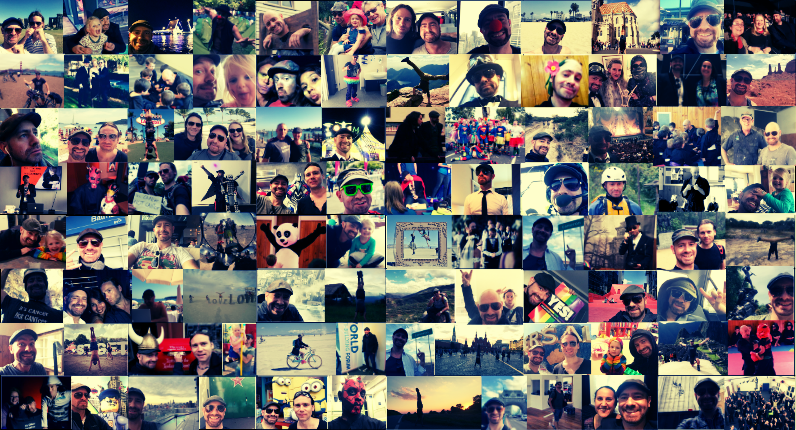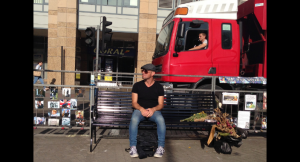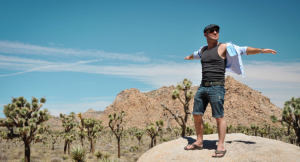The Evolution of Legacy
What would Cameron do?
Five years on, this thought still guides us.
In the months before Cameron died there was a lot of talk about change. Especially amongst his teaching team at Paragon, the general feeling was anxiety about being able to run his school without him, and fears about how everything would be different.
It seems so obvious now, that we should have been scared that it wouldn’t change, that things might stay exactly the same, except for the giant elephant in the room – that he was missing from us. What if nothing else changed?
Change, evolution, is, of course, necessary for survival. In fact, Cameron changed things all the time, sometimes seemingly on a whim, but in reality, there in the background, in his journals and his documents, we continue to find all the research, reasoning and rationale, even today. And if he were still alive, he would have continued to do so.
What would Cameron do? Being guided by his vision, his legacy, and our memory of him, makes it easier to know.
The question we are really asking is: What is the right thing to do? What is the kind thing to do? What is the most Super thing to do, in this situation?
The Paragon Legacy
(Nathan and Teresa)
Perhaps it wasn’t as much being scared of things changing, but being scared they might change so much that it was no longer his school, and no longer embodying his vision. We didn’t want to “break” his school. But we couldn’t stop at a snapshot taken five years ago. The school needed us to carry it forward exactly as he had intended us to.
Sensei Cameron transformed his karate school into a superhero school. Some of the traditions remained, where he was satisfied that they fit within the culture of a superhero community, and were not just a remnant of Paragon’s origins, being retained for their own sake. Everything he kept had a purpose. Everything he changed had a reason. He still believed that every person had a black belt in them. But this evolved to working to bring out the superhero in every person as part of that black belt journey.
Can you do 100 pushups? Great, now can you do 500 acts of kindness?
Can you demonstrate a kata? Okay, now can you demonstrate a change for the better in the world around you?
What would Sensei Cameron do? His legacy is strong, and his vision (See Cameron’s Vision video HERE) was so clear. So we know the trajectory he would have followed if he had time. What his school was and what it would become. The school has grown, as have we.
But Cameron wasn’t just the Sensei of this amazing superhero karate school.
Cameron also had a life outside of Paragon! Authenticity was important to him, so he was pretty consistent in his other lives. But his memory also shapes the legacies of friendship, of brotherhood, and of our personal and professional relationships with him.
Cameron’s Legacy as a therapist
(Teresa)
When looking at Cameron’s legacy beyond his Paragon Superhero School, it doesn’t take much to feel his influence outside the walls of the Supercentre.
Whenever we talk about being custodians of his legacy, we have to remember that we also have our own lives, our own legacies that we are building, and that we will one day leave behind. Not everything we do is about Cameron. Our lives are not driven solely by Cameron or his memory. For example, we have our own careers that existed before Cameron left us, and they continue today, alongside the work we do in his name.
Professionally, though, we were always aligned, or honouring his legacy would mean a conflict of values. Recognising his influence, catching ourselves and allowing his guidance when it’s needed, and remembering the way he worked, and all that he taught us (and what he allowed us to teach him as well) shows us the path. He was a gentle teacher. He was a humble student. He refused to remain ignorant about things that were outside his knowledge base or experience. He was an avid reader and was always seeking to know more, to understand. This was not with the goal of acquiring knowledge for its own sake, but to improve the ways he could help people.
As a therapist, he would look at the gold standard of practice, and build programs that went beyond that. His hunger for achieving impossible things of course extended into his life as a paediatric physiotherapist. He challenged systems and expectations, and refused to accept that there weren’t better ways, whether it was funding models, organisational practices, or therapeutic interventions. He operated within a neuroaffirmative practice approach before that term was ever coined. He built models of inclusion before it was a buzzword. He created programs to provide therapy that didn’t feel like therapy for the people he worked with, and he co-created client-led interventions to build skills based on their own goals, not on the expectations of others around their capacity or disabilities.
What would Cameron do now? He would continue to grow and learn as a therapist, using his kindness and superness to bring joy to the people he worked with. Just as he always did.
Cameron’s Legacy as a brother, uncle and father
(Nathan)
When asked ‘Do you have kids?’ Cameron would often answer ‘Yup, 200 of them!’ In fact, it was closer to thousands, given the years he crafted superheroes through his super school.
If a father’s role is to set a foundation for happiness, success and being a good and super person then Cameron was, and still is, a father. I have previously written about our brotherhood, and those writings show a boy who loved his big brother. Who put him on a pedestal that he fully deserved. It’s hard to explain to people who didn’t see our love for each other. This wasn’t just me looking up to my brother. Cameron took an active role in helping me grow up.
He is also a father to Lucas, his nephew.
One of Lucas’ favourite books is the Bluey story of the beach. In the story, Bluey is on an adventure to catch up with her mum. She has her mum’s footprints in the sand to follow if she wants, but she finds herself creating her own adventures and overcoming obstacles her own way. In the story, the footprints get washed away and Bluey continues on her adventure making her own path. Uncle Cameron’s legacy is a lot like footprints in the sand for both Lucas and me. (And I imagine it is the same for my sister Kelli, and Abbi, her daughter and Cameron’s niece). When we need it, we can look where the footprints lead. But we can also run and skip and do cartwheels in the sand when we want.
Lucas Cameron Gill was given his uncle’s name not because of any shoes to fill, but instead some footprints in the sand to guide him if he wants to see where they lead.
Whilst Cameron never met his nephew, he still has a huge impact on his upbringing. What would Cameron do? I often catch myself thinking this when trying to solve some sort of curveball that Lucas has thrown me.
Lucas is running up to me. “Dad! Dad! Dad! Dad!” I’m busy doing something that I remember being important at the time, but now I realise it was not. “Dad! Dad! Dad!” He grabs my leg. “Dad! Dad! Dad!” He starts scaling me like a mountain, setting basecamp at my waist to stop and yell some more. “Dad! Dad! Dad!” He grabs at my shirt, slips and falls back to the ground. “Dad! Dad!”
I want to yell back, ‘What!!!!’
But I stop, I catch myself. What would Cameron do? Listen to the excitement in Lucas’ voice, see the joy in his eyes, enter into his world. Something is so amazing that he simply must tell you now. Nothing else matters. This is the best thing in the world. I stop, I bend down and I listen.
“I have a flower for you!”
Was it worth all that excitement? Absolutely! Thanks Cameron.
The legacy of friendship
(Teresa)
In the beginning, when it was harder to do things without him, I would go to the place where he rests. I would sit beside him and talk. My voice would be lost in the sound of the wind in the nearby trees, and then I would wait and listen. I would hear his answers come back to me on the breeze, and this was like a conversation, talking things through with him. It was what I did when he was with us, after all.
Of course it wasn’t him talking back to me. Of course those answers came from within me, from my knowing of him and the place he holds in my memories. Still, it allowed space for reflection and a better mindset for making decisions, for knowing what to do, for doing things without him.
Now I don’t need to visit him to know the answers to questions I would want to ask him.
They say time and proximity helps us heal. Maybe it’s not time or proximity. Maybe it’s filling the empty space left behind with things that represent the person we have lost. When your heart is full and your life is busy doing things you love that help you remember them, it is easier to feel them close to you, and there is less space to feel sadness every day. There is pride and confidence and knowing that they would be happy for us too.
Guarding and growing his legacy, and doing our best to continue to bring his vision to life… this is how we honour him and how we miss him. He didn’t want us to be saddened or hurt by our memories.
So what would Cameron do? He would always try to do what was right, and kind and super. He would mess up and he would apologise and he would do better. He would live and he would learn. And he would do what he loved, every day.
And we do that too.
Want to learn more about Cameron Gill’s journey, his legacy, and his legacy projects? CLICK HERE for Cam’s official Facebook legacy page. We have heaps more of his story to share, so like and follow to stay updated.




Over five years gone does not seem right, but he is definitely in the hearts and minds of many. I have been thinking about Cameron and how he could bring out the superhero in someone, a lot over the last year.
Last year, my eldest was chosen to represent his school for relay. This year after winning a fist full of ribbons he made the athletes team. He gave a sad smile and said Sensai would be proud. My heart and eyes swelled at the same time. Kirby was never a natural athlete, it was something he had to work for.
Sensai was originally Cameron the Physiotherapist for Kirby, working to correct his funky run style from a broken arm as a toddler, and general uncoordinated, awkward movements. Thank you Cameron the physio and Sensai Cameron, forever in our hearts 💕